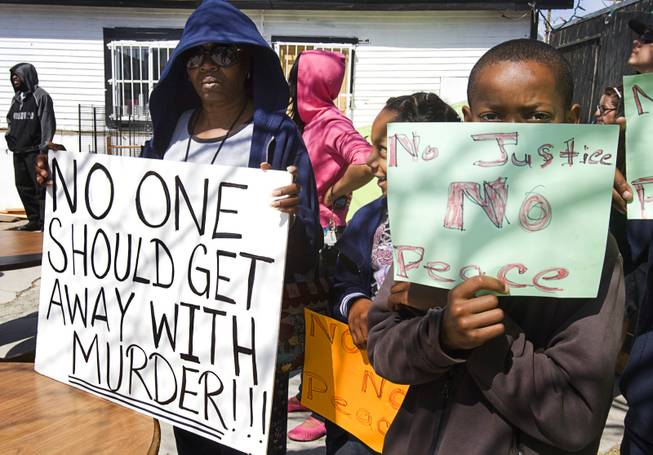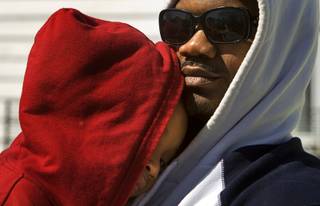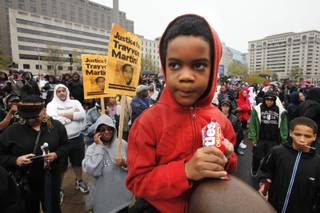
Blondzzetter Jordan , left, and grandson Edwin Johnson, 11, hold signs during a “hoodie” gathering at Raw Remedies, a therapeutic beauty boutique at 203 East Colorado St. near Charleston and Casino Center boulevards Sunday, March 25, 2012. People, many wearing hooded sweatshirts, came seeking justice for 17-year-old Trayvon Martin, a high school student who was shot and killed February 26 in Sanford, Fla.
Sunday, April 1, 2012 | 2 a.m.
As the country tries to understand how Trayvon Martin — a hoodie-clad 17-year-old armed with nothing more than a cellphone, can of iced tea and bag of Skittles — was shot to death in Florida in February without anyone being charged, every possible culprit is being considered.
There’s the shooter, neighborhood watch captain George Zimmerman, who has offered a questionable claim of self-defense, and the conduct of Sanford law enforcement officials who decided not to prosecute.
But some of the sharpest outcry has focused on Florida’s “stand your ground” law, which justifies use of deadly force in self-defense, with no obligation to first attempt to retreat.
In Las Vegas, officials and academics are taking a close look at the Martin case, and for good reason: Nevada recently passed a law nearly identical to Florida’s, leading many to believe a similar tragedy could play out in the Silver State.
“The circumstances are ripe for a Trayvon situation to happen here,” said Sylvia Lazos, a law professor at UNLV's Boyd School of Law. “We have a lot of crime. We have a lot of people with guns. We have a lot of people who are untrained. We have to watch it. ... These combinations can be quite toxic.”
Nevada is one of 25 states, according to the Legal Community Against Violence, with a law allowing individuals to use deadly force when they feel threatened with no obligation to stand down or try to avoid violence once reasonable fear is established.
Nevada’s “stand your ground” law was approved by the 2011 Legislature and took effect in October. It allows that as long as a person who feels threatened didn’t initiate the altercation and isn’t doing anything criminal, that person can stand and use deadly force and it would be considered “justifiable homicide.”
Such laws “are all designed to allow for some expanded notion of self-defense,” Lazos said. “The problem that you have when regular people engage in self-defense ... is that people make decisions fairly quickly about whether they are, in fact, in danger.”
In many ways, the law codified an older standard: Since 1990, case law in Nevada has upheld that use of deadly force as a first option is legitimate self-defense. That’s partially why groups as disparate as the American Civil Liberties Union and National Rifle Association were able to come together to support last year’s legislation with little fanfare, and why only three members of the Legislature — all Assembly Democrats from Las Vegas — voted against it.
“The cynical view would be (supporting these laws) gets people re-elected for being tough on crime,” said Christopher Blakesley, a professor of criminal law at UNLV. “That’s part of the psychological problem. ... You can end up passing laws that kind of reach a potentially dangerous level.”
The chief author of and agitator for the law, Assembly Speaker John Oceguera, bristled at the suggestion that Nevada’s law creates any room for a Trayvon Martin-type tragedy here.
“This bill says we believe if a Nevadan is attacked, they should be able to defend themselves. ... It is not the same as the Florida law,” Oceguera said in a statement. “If a vigilante chased a kid in a hoodie down the street and killed him, under Nevada law, I would think that vigilante would be prosecuted to the fullest extent possible.”
But Blakesley disagrees. Codifying rules of self-defense in such form creates the potential for vigilante justice — or even manipulation by criminals, he said.
“What about gangs?” Blakesley said. “Two gangs, and one sees someone with the other gang’s color walking toward them. Bam. They’d have a reasonable basis to say, ‘I was threatened. The person looked at me and was coming at me, and I killed him to save my life.’
“On the other hand, some may consciously say, ‘OK, I’m going out on a marauding expedition; I’m going to find someone who looks dangerous and get rid of them.’ People who kill under these circumstances usually are doing it in straight-out, good-faith self-defense, and it just happens. ... But are the limitations enough to protect against that? ... That’s what we’re going to have to wait and see.”
•••
The most damning data on Florida’s “stand your ground” law is that since its adoption in 2005, self-defense claims in violent crimes have risen.
With only a five-month track record for Nevada’s law, it’s impossible to draw a comparison — though overall, violent crime in Las Vegas has been trending down.
Supporters of the Nevada law argue that comparisons between Nevada’s and Florida’s laws are inappropriate, especially when the comparison hinges on the Martin case.
“I think it’s good to have it spelled out in the law. ... That assists people on all sides,” said John Cahill, a retired peace officer and firearms instructor who is Clark County's public administrator. “I don’t like it that our Nevada law is under attack because someone did something in Florida. ... I don’t want to lose my rights here in Nevada because some yahoo is misusing a statute in Florida.
“If you look at the cases in those states, there’s no evidence that the law is the problem. If the law were the problem, there wouldn’t be a law anywhere.”
What the Nevada law — and almost every other law of its kind — hinges on is the idea that the actor must have a reasonable belief that his or her life is in danger, such that anyone in a similar situation would make a similar judgment.
The reasonable standard was consciously chosen by the drafters of Nevada’s law. Bills to substitute a “bare fear” standard — a subjective standard in which simply saying, “I was afraid,” is enough to claim self-defense — have been floated in the last three legislative sessions but not progressed out of committee.
Still, who applies the reasonable standard? If there are no witnesses as in the Martin case, that burden usually falls to a jury. Except in Florida.
In Florida, if a person uses violence and claims self-defense, the “stand your ground” law there says the person “is immune from criminal prosecution and civil action for the use of such force.”
“What that basically says is that if anybody says that the killing was justifiable, the state can’t prosecute — and that includes arresting,” said Addie Rolnick, who teaches law at UNLV. “They can investigate whether the force was justifiable, but they can’t arrest until they have probable cause to believe the force was not justified.”
That was part of the problem in Florida, where Zimmerman was never charged with a crime.
“Nevada doesn’t have that,” Rolnick explained. “In the state, the burden is still on the defendant, and that’s a very significant difference.”
Getting a person who used deadly force against another into a courtroom is especially important when the act of self-defense is prompted not by an attack, but the fear of one.
“We know that stereotypes do influence that quick-thinking assessment and judgment about whether someone is in danger and whether self-defense action is needed,” Lazos said. “There has been research done — people do have racial stereotypes in their head, and if they are untrained, they will respond to ambiguous conduct by a black person much more impulsively by pulling the trigger.”
•••
While Nevada’s “stand your ground” law hasn’t been tested in a case like Martin’s, Las Vegas confronted a similar set of issues in the case of Demarcus Carter, an unarmed 19-year-old who was shot and killed in the backyard of a Summerlin house by a homeowner who believed Carter was going to rob him.
It is legal in Nevada, as in many other states, for homeowners to shoot to kill in defense of property. Coincidentally, Nevada’s “castle doctrine” was implemented in the same law that formalized the state’s “stand your ground” practice of self-defense in 2011.
Carter’s case is an example, legal scholars say, of the varied ways people experience fear that can cause them to use a deadly weapon — and later claim that fear as a basis for self-defense. As in the Martin case, many see race as a key factor.
“Many people — the majority black and non-white — are caught up in these self-defense laws because it’s a lot easier for the public to understand them as dangerous and deserving of being killed,” Rolnick said. Carter "was in a backyard, he had a criminal record, and he was a larger, much more imposing black man than Trayvon, who was basically a kid. Once that stuff comes out, people aren’t as concerned.
“Everyone, not just openly racist people, respond to racial cues. There’s a lot of really troubling suggestions that we can’t actually trust our brains to be reasonable about what fear is in light of the way race works.”
Cahill said gun owners need to take that information into account.
“If a person’s skin color, the way they dress, the way they comb their hair — if you know those things create certain fears in you, you’re going to have to set those aside if you’ve got a gun. It changes everything,” he said.
But others argue that individual responsibility can only go so far, and at some point a law that sanctions deadly force can also influence citizens’ actions.
“Part of the talk in Florida has been to say, ‘This case is exceptional,’” Blakesley said. “If that makes legislators and people not think about the validity of such a law ... then that’s bad. One of the torturous things about criminal law is that awful situations give rise to really great teaching moments. And it’s painful, but important, to deal with them.”



Join the Discussion:
Check this out for a full explanation of our conversion to the LiveFyre commenting system and instructions on how to sign up for an account.
Full comments policy